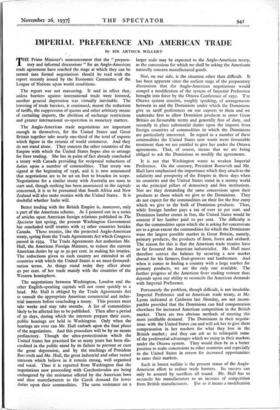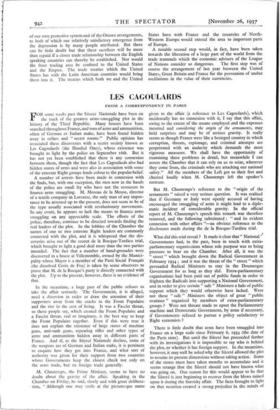IMPERIAL PREFERENCE AND AMERICAN TRADE
By SIR ARTHUR WILLERT
THE Prime Minister's announcement that the " prepara- tory and informal discussions " for an Anglo-American trade agreement have reached the stage at which they can be turned into formal negotiations should be read with the report recently issued by the Economic Committee of the League of Nations upon world conditions.
The report was not reassuring. It - said in effect that, unless barriers against international trade were lowered, another general depression was virtually inevitable. The lowering of trade barriers, it continued, meant the reduction of tariffs, the suppression of quotas and other arbitrary means of curtailing imports, the abolition of exchange restrictions and greater international co-operation in monetary matters.
The Anglo-American trade negotiations are important enough in themselves, for the United States and Great Britain together take nearly one-third of the total of exports which figure in the returns of world commerce. And they do not stand alone. They concern the other countries of the Empire with which the United States hopes also to arrange for freer trading. She has in point of fact already concluded a treaty with Canada providing for reciprocal reductions of duties upon a number of commodities. That treaty was signed at the beginning of 1936, and it is now announced that negotiations are to be set on foot to broaden its scope. Negotiations for a similar treaty with Australia are soon to start and, though nothing has been announced in the capitals concerned, it is to be presumed that South Africa and New Zealand will also make treaties with the United States. It is doubtful whether India will.
Better trading with the British Empire is, moreover, only a part of the American scheme. As I pointed out in a series of articles upon American foreign relations published in The Spectator last spring, the present Washington Government has concluded tariff treaties with 15 other countries besides Canada. These treaties, like the projected Anglo-American treaty, spring from the Trade Agreements Act which Congress passed in 1934. The Trade Agreements Act authorises Mr. Hull, the American Foreign Minister, to reduce the current American duties by up to so per cent. in making his treaties. The reductions given to each country are extended to all countries with which the United States is on most-favoured- nation terms. As things stand today they affect about 4o per cent. of her trade mainly with the countries of the Western hemisphere.
The negotiations between Washington, London and the other English-speaking capitals will not come quickly to a head. Mr. Hull is obliged by the Trade Agreements Act to consult the appropriate American commercial and indus- trial interests before concluding a treaty. This process must take weeks and may take months. A list of commodities likely to be affected has to be published. Then after a period of 3o days, during which the interests prepare their cases, public hearings are held in Washington. Only when the hearings are over can Mr. Hull embark upon the final phase of the negotiations. And this procedure will be by no means perfunctory. Though the ultra-protectionism which the United States has practised for so many years has been dis- credited in the public mind by its failure to prevent or cure the great depression, and by the teachings of President Roc 'evelt and Mr. Hull, the great industrial and other vested interests which believe in it remain strong, well organised and vocal. Thus it is reported from Washington that the negotiations now proceeding with Czechoslovakia are being endangered by the resistance offered by the American boot and shoe manufacturers to the Czech demand for lower duties upon their commodities. The same resistance on a larger scale may be expected to the Anglo-American treaty, as the concessions for which we shall be asking the Americans naturally concern manufactured goods.
Nor, on our side, is the situation other than difficult. It has been apparent since the earliest stage of the preparatory discussions that the Anglo-American negotiations would compel a modification of the system of Imperial Preference brought into force by the Ottawa Conference of 1932. Tne Ottawa system consists, roughly speaking, of arrangements between us and the Dominions under which the Dominions give us tariff preferences on our exports to them and we undertake first to allow Dominion products to enter Great Britain on favourable terms and generally free of duty, and secondly to place substantial duties upon the imports from foreign countries of commodities in which the Dominions are particularly interested. In regard to a number of these commodities the United States now wants more favourable treatment than we are entitled to give her under the Ottawa agreements. That, of course, means that we are being obliged to ask the Dominions to modify the agreements.
It is not that Washington wants to weaken Imperial Preference. On the contrary, President Roosevelt and Mr. Hull have emphasised the importance which they attach to the solidarity and prosperity of the Empire in these days when its countries and the United States stand in a stormy world as the principal pillars of democracy and free institutions. Nor are they demanding the same concessions upon their products as those which we give to the Dominions. They do not expect for the commodities on their list the free entry which we give to the bulk of Dominion products. Thus, while foreign lumber pays a tax of over 20 per cent. and Dominion lumber comes in free, the United States would be content if her lumber paid ro per cent. The difficulty is that the commodities upon which she is asking for concessions are to a great extent the commodities for which the Dominions want the largest possible market in Great Britain, namely, primary products, the products of farm, forest and orchard. The reason for this is that the American trade treaties have so far favoured the American industrialist. Mr. Hull must therefore correct the balance by securing a new market abroad for his farmers, fruit-growers and lumbermen. And when it comes to finding a country with a large market for primary products, we are the only one available. The further progress of the American freer trading venture thus depends upon our ability to reconcile the American demands with Imperial Preference.
Fortunately the problem, though difficult, is not insoluble. Imperial Preference and an American trade treaty, as Mr. Lyons indicated at Canberra last Monday, are not incom- patible provided that the Dominions can find compensation elsewhere for increased American competition in the British market. There are two obvious methods of meeting this most justifiable demand. The Dominions in their negotia- tions with the United States can and will ask her to give them compensation in her markets for what they lose in the British market ; and they can ask us to relinquish some of the preferential advantages which we enjoy in their markets under the Ottawa system. They would then be in a better position to make concessions to other countries and especially to the United States in return for increased opportunities to enter their markets.
Such in barest outline is the present status of the Anglo- American effort to reduce trade barriers. Its success can only be assured by sacrifices all round. Mr. Hull has to reconcile his manufacturers to an increase of competition from British manufacturers. Vor us it means a modification of our own protective system and of the Ottawa arrangements, to both of which our relatively satisfactory emergence from the depression is by many people attributed.- But there can be little doubt but that these sacrifices will be more than repaid if a closer trade relationship between the English speaking countries can thereby be established. Nor would the freer trading area be confined to the United States and the Empire. The trade treaties which the United States has with the Latin American countries would bring them into it. The treaties which both we and the United States have with France and the countries of North- Western Europe would extend the area to important parts of Europe.
A notable second step would, in fact, have been taken towards the liberation of a large part of the world from the trade trammels which the economic advisers of the League of Nations consider so dangerous. The first step was of course the arrangement of last year between the United States, Great Britain and France for the prevention of undue oscillations in the value of their currencies.















































 Previous page
Previous page